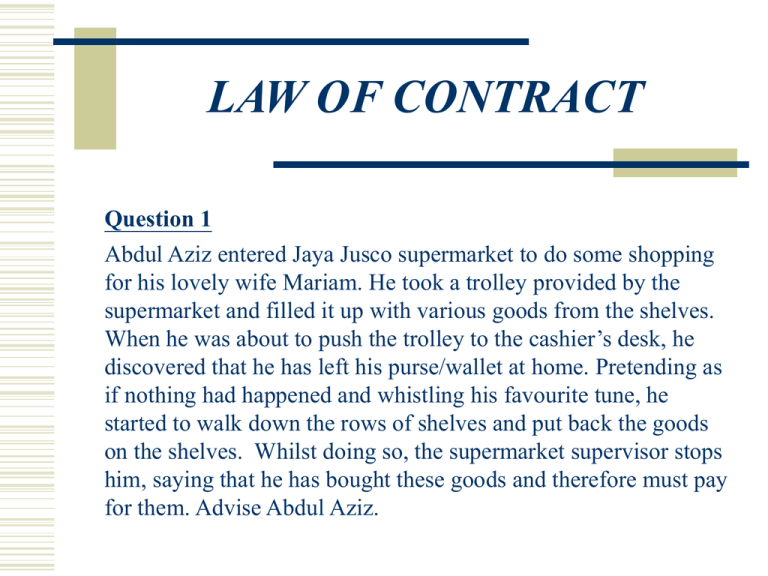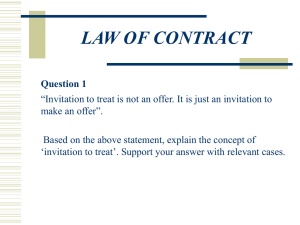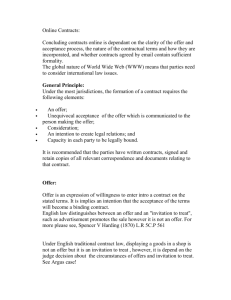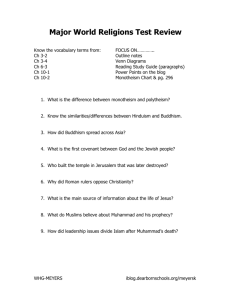LAW OF CONTRACT Answer: (Continuation)
advertisement

LAW OF CONTRACT Question 1 Abdul Aziz entered Jaya Jusco supermarket to do some shopping for his lovely wife Mariam. He took a trolley provided by the supermarket and filled it up with various goods from the shelves. When he was about to push the trolley to the cashier’s desk, he discovered that he has left his purse/wallet at home. Pretending as if nothing had happened and whistling his favourite tune, he started to walk down the rows of shelves and put back the goods on the shelves. Whilst doing so, the supermarket supervisor stops him, saying that he has bought these goods and therefore must pay for them. Advise Abdul Aziz. LAW OF CONTRACT Question 2 On 1 November 1989, Muhammad who lives next door to Abdul Aziz called on Abdul Aziz and offered to sell his IBM computer for £2,000. On 3 November 1989 Abdul Aziz wrote and posted a letter to Muhammad accepting the offer. The letter was not addressed properly. Hence Muhammad received the letter of acceptance on 8 November 1989 instead of 5 November 1989. On the evening of 6 November 1989, Muhammad telephoned Abdul Aziz and said, ‘I revoke my offer.’ Advise Muhammad. LAW OF CONTRACT Question 1 Answer Plan: Identify the issue (s) that the problematic question is addressing i.e. whether ‘display of goods in a supermarket’ would amount to an offer or it is a mere case of an invitation to treat. Apply the law on the issue (s) identified. For example, the question expects students to differentiate between an offer and invitation to treat in the context of the facts given. Take note of the necessary requirements for a valid offer. By making reference to the law, what do you think of the supervisor’s act or conduct? Was he right? Conclusion. LAW OF CONTRACT Answer: Introduction: • You need to stated that for there to be a valid contract between Abdul Aziz and Jaya Jusco supermarket, certain requirements need to be satisfied as far as contract law is concerned i.e. offer, acceptance, consideration and intention to create legal relations. From the facts given, once again you need to state that the issue here is as to whether ‘display of goods in a supermarket’ would amount to an offer or it is a mere case of an invitation to treat. (Define these two terms). An offer is defined as a proposition put by one person to another person made with the intention that it shall become legally binding as soon as the other person accepts it. (See also sec 2(a) of the Contracts Act 1950 on how the term ‘offer’ is defined). On the other hand, an invitation to treat is a statement made by one person asking the other to make the first person an offer. LAW OF CONTRACT Answer: (Continuation) The body: • You need to state that regarding the issue of ‘display of goods in a supermarket’ as to whether it is an offer or not, reference should be made to some of the requirements needed for a valid offer e.g. the offer must be communicated to the offeree (promise) before it can be accepted. This is the general rule. Based on such analysis, contract law considers ‘display of goods in a supermarket’ as a case of invitation to treat and not an offer. Why? Because the offer is not communicated by merely displaying the goods on the shelves. It is only communicated the moment the buyer is at the cashier’s counter making payment. (See the case of Pharmaceutical Society of Great Britain v Boots Cash Chemists Ltd- where the court was faced with the issue as to when and where the sale of the medicine took place. Was it when a customer put the medicines in her shopping basket or was it when she presented the goods to the cashier. The court held that the sale could only be said to have taken place when the customer presented the goods to the cashier) LAW OF CONTRACT Answer: (Continuation) • You need to state that ‘goods on display in a supermarket’ only shows that the other party (i.e. the seller) is merely inviting offers, which he is then free to accept or reject. Thus, meaning to say the supermarket (the seller) did not intend that there should be an ‘intention to create legal relation’. This is on the basis that an ‘invitation to treat’ is an offer to negotiate. (See the case of Fisher v Bell- where the court stated that goods on display are inviting customers to make an offer to buy them from the shopkeeper). LAW OF CONTRACT Answer: (Continuation) • You need to state that the mere statement or indication of price on the goods on the shelves could not be viewed as a case of saying that there is a valid offer between Abdul Aziz and the supermarket. This could not be argued in the context of consideration and thus stating there was a valid contract. (See the case of Fisher v Bell – where the Court of Appeal treated the point beyond dispute stating that: “It is perfectly clear that according to the ordinary law of contract the display of an article with a price on it in a shop window is merely an invitation to treat. It is in no sense an offer for sale, the acceptance of which constitute a contract”. (See whether the rule laid down in Havey v Facey could be applied here) LAW OF CONTRACT Answer: (Continuation) • You need to state that since we cannot establish the necessary elements of a valid contract i.e. offer, acceptance, consideration and intention to create legal relation from the facts given, it is, therefore, right to conclude that Abdul Aziz was merely being invited by the supermarket to make an offer. Hence, the supervisor of the supermarket was not right to say that by putting the goods in the trolley- Abdul Aziz bought them and must pay for the goods. LAW OF CONTRACT Answer: (Continuation) Conclusion: • You need to state that although the rule (distinction between invitation to treat and an offer) is well settled, its application to self service stores has been criticised because it overlooks the moral rights of the prospective customer. LAW OF CONTRACT Question 2 Answer Plan: • Address the issue (s) that the problematic question is addressing i.e. whether there was a valid offer made and followed by acceptance of the said offer. In other words, could it be said that there was a valid communication of the acceptance from the other party (Abdul Aziz)? Was it reasonable for the other party (Abdul Aziz) to resort to this mode of communication in accepting the proposal/offer from his neighbour Muhammad? Assuming that it was clearly stated in the proposal i.e. the means of communication, what would have been the effect of the letter not being properly addressed to the other party (Muhammad) and was well as the revocation of the offer. • Apply the law on the issue (s) identified. For example, the question requires a thorough discussion on the ‘postal rule’ like the rules governing its application, etc. • Conclusion. LAW OF CONTRACT Question 2 Answer: Introduction • Point out that the first requisite of any contract is an agreement (consisting of an offer and acceptance). In other words, there must be an offeror and an offeree. In the present case, Muhammad is considered as the offeror and Abdul Aziz as the offeree. However, point out that the important point to address here is as to whether the communication of the acceptance was conveyed to the other party (Muhammad) for us to say that there was a valid agreement between the two parties. Here, reference must be made to the ‘postal rule’ and the conditions surrounding its application. LAW OF CONTRACT • • Question 2 Answer: (Continuation) The body: Point out that the gist of the problematic question revolves around the ‘postal rule’. This rule only applies when the acceptance is sent by post or telegram. Acceptance here takes effect when the letter is posted. (See sec 4(2)(a) and (b) of the Contracts Act 1950). In other words, with regard to postal communication and telegraph, acceptance is complete upon posting or dispatch of the telegram. The ‘postal rule’ is an exception to the general rule that the acceptance is only complete when it is communicated to the offeror/proposer. Point out that in advising Muhammad, it is important to touch on the fundamental principles surrounding the ‘postal rule’. Point out that where a party uses the post as his means of communicating acceptance, it must be reasonable in all circumstances. (See sec 7(b) of the Contracts Act 1950 where it is provided that in order to convert a proposal/offer into a promise the acceptance must be expressed in some usual and reasonable manner unless the proposal/offer prescribes the manner in which it is to be accepted). Was it reasonable for a neighbour to use this mode of acceptance? LAW OF CONTRACT Question 2 Answer: (Continuation) • Still in advising Muhammad, point out that it would not be normal to reply by letter a proposal that he made to his neighbour Abdul Aziz unless he had clearly stated the mode of acceptance i.e. by letter. Assuming that Muhammad did not state clearly the mode or means of acceptance of the proposal/offer from his neighbour Abdul Aziz, the governing principle is that where a party uses the post as his means of communicating acceptance, the circumstances must be such that ‘it must have been within the contemplation of the parties that, according to the ordinary usages of mankind, the post might be used as a means of communicating the acceptance of an offer’ as per the case of Henthorn v Fraser. Based on this principle, it could not be said that Muhammad and Abdul Aziz had that kind of contemplation in mind i.e. that Abdul Aziz will respond to the offer via a post. So, what’s the effect of the revocation made by Muhammad? LAW OF CONTRACT • Question 2 Answer: (Continuation) In advising Muhammad, point out also by way of making an assumption as to what would have been the situation assuming that Muhammad clearly stated that the acceptance of the proposal/offer must be made by way of a post. If that were to be the position, then the promisee or offeree (Abdul Aziz) is bound to accept in the prescribed manner. From the facts of the case, it would then be alright for Abdul Aziz to do what he did irrespective of being neighbours with Muhammad. Hence, communication of acceptance here will be complete upon posting of the letter (i.e. 3 November 1989)- See the case of Adams v Lindsell where the rule was laid down. (See also the case of Ignatius v Bell- where the defendant, Bell, gave an option to the plaintiff to purchase a piece of land on condition that the option must be exercised on or before 20 August 1912 by a notice in writing. The plaintiff exercised the option by posting a letter on 16 August. The defendant only received the letter on 25 August. The plaintiff sued the defendant for specific performance. The Court of Appeal held that the acceptance was complete against the proposer, Bell (the defendant), when it was put into the post on 16 August). LAW OF CONTRACT Question2 Answer: (Continuation) • Still on the above issue, point out that although acceptance is complete upon posting of the letter, from the present facts given it is stated that the letter was not addressed properly and thus reached Muhammad on 8 November 1989 instead of 5 November 1989. Point out that in such a situation i.e. where a letter is not properly addressed- the governing principle is that the ‘postal rule’ will not apply. So, what do you think of Muhammad’s position revoking the offer? Was he right even after having made the assumption i.e. that he clearly stated the mode or means of acceptance e.g. by post. LAW OF CONTRACT Question2 Conclusion: • Point out that your advise to Muhammad will revolve around the issues pointed above and it is most unlikely for the court to consider that there was a valid mode or means of communicating the acceptance by Abdul Aziz to Muhammad because of the arguments presented above.





